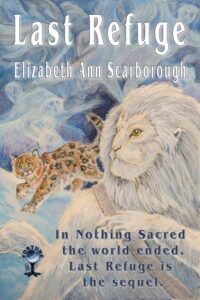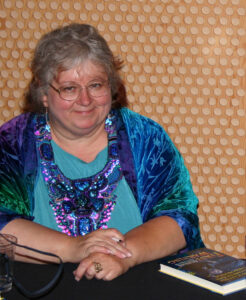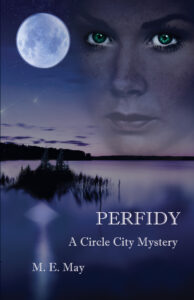I’m so excited to have Elizabeth Ann Scarborough at The Editing Essentials! I’ve admired her tenacity and determination to be a successful author for a long time. She never gives up, no matter what the circumstances. Back in 2004, I was thrilled when she wrote a story for my anthology, You Bet Your Planet. Please help me welcome her today!
Elizabeth Ann Scarborough is the author of 38 fantasy/science fiction books, 24 solo novels including the Nebula-award winning HEALER’S WAR and 16 in collaboration with Anne McCaffrey, including the two most recent, CATALYST and CATACOMBS, Tales of the Barque Cats. Her most recent novel is THE TOUR BUS OF DOOM, set in a town suspiciously like Port Townsend. It’s her third story featuring the heroic Spam the cat, and is a spoof on the zombie craze. The first book SPAM VS THE VAMPIRE is the first of the “purranormal” mysteries. Bridging the novels is the novelette, FATHER CHRISTMAS. Please visit her website at: http://www.eascarborough.com/
Look Who’s Talking
The most important thing I need to know when I write a story is whose story it is. In fact, sometimes the viewpoint is the story when the plot is a familiar or classic one and the usual cast of characters is as time-worn as the Velveteen Rabbit’s fur. There aren’t all that many plots, after all, and none of them are actually new–or haven’t been for a very long time. But the stories we want to tell, and the ones readers gravitate towards, have certain universal elements that make them familiar.
If the central viewpoint is enlightening and informative of an entirely different facet of a story, it can actually make it new, suggesting an entirely different series of events than the original. Reinventing the villain from the Wizard of Oz, Gregory MaGuire created Wicked, the Life and Times of the Wicked Witch of the West (The Wicked Years). As Elphaba’s thoroughly grown-up tale, it becomes not only one different Oz-ish story but a series of them almost as extensive as the original Oz books. Elphaba isn’t thoroughly wicked, and those characters we’ve previously seen as thoroughly good, turn out simply to have had good press.
On a less complex level, other fairytales are often retold from a different character’s viewpoint to try to shake up a stereotype and allow readers to rediscover the tale from a new angle. Cinderella has been written, acted and sung from the viewpoint, at least partially, of the wicked stepsisters and their mother. In the past year, two different movies were made about Snow White, who may have been the protagonist, but the wicked queen, her stepmother, was the interesting, glamorous one. The reinvention of her character for Julia Roberts was brilliant and put a modern, accessible twist on the role that it never would have had if told only from Snow White’s viewpoint.
The “villain” usually doesn’t see himself or herself as a bad person, and neither should the writer when telling their versions of the story. It’s very possible the hero and the villain simply have different goals in life, or different interests in certain outcomes. We probably all know someone who has a lot of “bad luck” although there is never, according to them, anything they did to bring it upon themselves. They were either justified, victimized by circumstances, or someone was plotting against them.
Your characters don’t have to be totally good or wicked to see things in such dramatically different ways as to set them at odds with each other.
 I had a very nice mother, but her memory of certain events we both attended is so unlike mine that they might not have been the same occasions. If we were characters in one of my stories, I’d try to understand why she saw it her way as well as why I saw the same incident so differently.
I had a very nice mother, but her memory of certain events we both attended is so unlike mine that they might not have been the same occasions. If we were characters in one of my stories, I’d try to understand why she saw it her way as well as why I saw the same incident so differently.
That kind of conflict is certainly less dramatic than the fairytale kind and yet can be used to good effect if one bears in mind how annoying and baffling it can be to have people you thought you knew and even liked behave in ways you consider immoral or selfish, as in The Help, while they disapprove of you just as strongly.
I do admire an author who can capture the nuances of human nature accurately and use them to turn a plot at the same time. M.C. Beaton, aka Regency romance writer Marion Chesney, writes a series of contemporary mysteries that’s fun partially because it counters traditionally romantic stories while retaining a sense of reality.
The heroine, Agatha Raisin, a successful ad exec now a detective, is always falling madly for some good looking man, and at least two of them are interested in her only when she stops stalking them, and starts stalking murderers. There’s nothing remotely like a romantic novel romance in Agatha’s life, but there is friendship and admiration, unexpected emotional support when she least expects it and sometimes fleeting mutual lust. It isn’t done cynically but it seems very true.
The mysteries themselves aren’t nearly as involving as the characters. By now we all know that if the killer isn’t a psycho nut job it’s someone who stands to gain through love, or more probably money. But Agatha’s character makes it fun again, and ventilates scenarios that otherwise might be a bit stale.
Less specifically, but still of great practical benefit, understanding your characters and writing them as if they were real people with their own memories of events can be very helpful in submitting stories to theme anthologies. I edited four and published stories to about fifty more.
 For instance, in an anthology about Warrior Princesses, which I proposed during a time when Xena was very popular, each contributing writer had a distinct idea about what a warrior princess was. I was particularly floored by a two page submission from a friend who hasn’t written another story before or since, about a retirement home for aging warrior princesses, as told through correspondence between the facility and Her Fierce Highness’s anxious adult daughter. Absolutely ridiculous and yet well enough grounded in familiar concerns that I felt that if there were real warrior princesses, of course they would need a specialized retirement home.
For instance, in an anthology about Warrior Princesses, which I proposed during a time when Xena was very popular, each contributing writer had a distinct idea about what a warrior princess was. I was particularly floored by a two page submission from a friend who hasn’t written another story before or since, about a retirement home for aging warrior princesses, as told through correspondence between the facility and Her Fierce Highness’s anxious adult daughter. Absolutely ridiculous and yet well enough grounded in familiar concerns that I felt that if there were real warrior princesses, of course they would need a specialized retirement home.
In Anne McCaffrey’s touching story, The Ship Who Sang, Helva, the heroine, is challenged about whether or not she has been trained to have a sense of humor. “We are directed to develop a sense of proportion, sir, which contributes the same effect.”
As writers, it’s up to us to find our characters’ perspectives.
One other thing. While it’s necessary to have speeches properly attributed in dialogue, if you can tell who’s speaking by what each character is saying and how he or she is saying it, it is very successful dialogue.
Thank you, Elizabeth, for your sharing your tips and being with us today! 🙂 If you have questions for her, please feel free to post. Thank you!
Essay by Elizabeth Ann Scarborough, © 2012.





